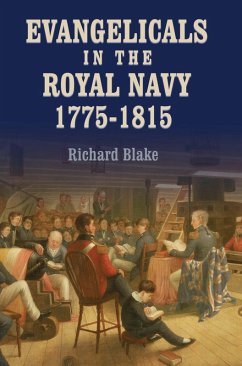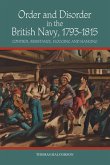Religious activity flourished in the eighteenth-century navy; this book examines the reasons why and its manifestations.
The Evangelical Admiral Gambier, notorious for distributing tracts to his fleet in a theatre of war, is commonly seen as a misfit in a fighting service that had scant time for fervent piety. In fact, the navy of the Revolutionaryand Napoleonic Wars showed a level of religious observance not seen since the days of Queen Anne. Evangelical laymen provided one dynamic for this change: concentrating first on public worship, they moved to active proselytism insearch of converts amongst sailors, and in a third phase developed a loose network of prayer groups in scores of ships, uniting officers and seamen in voluntary gatherings that transcended rank.
This book explores the effect this new piety had on discipline and human governance, on literacy, on the development of chaplains' ministry and on the mindset of the officer corps. It also looks at the larger question of how its values were absorbed into the ethos of the navy as a whole. It draws on sources both familiar and unusual - logs, letters, minutes, memoirs, tracts and sermons, Regulations - to explain how evangelical influence affected officer corps, lower deck andAdmiralty, showing how a movement that began by promoting public worship at sea became an agency for mass evangelism through literature, preaching and off-duty gatherings, where officers and men met for shared Bible reading and prayer a mere decade after the great Mutinies.
The Evangelical Admiral Gambier, notorious for distributing tracts to his fleet in a theatre of war, is commonly seen as a misfit in a fighting service that had scant time for fervent piety. In fact, the navy of the Revolutionaryand Napoleonic Wars showed a level of religious observance not seen since the days of Queen Anne. Evangelical laymen provided one dynamic for this change: concentrating first on public worship, they moved to active proselytism insearch of converts amongst sailors, and in a third phase developed a loose network of prayer groups in scores of ships, uniting officers and seamen in voluntary gatherings that transcended rank.
This book explores the effect this new piety had on discipline and human governance, on literacy, on the development of chaplains' ministry and on the mindset of the officer corps. It also looks at the larger question of how its values were absorbed into the ethos of the navy as a whole. It draws on sources both familiar and unusual - logs, letters, minutes, memoirs, tracts and sermons, Regulations - to explain how evangelical influence affected officer corps, lower deck andAdmiralty, showing how a movement that began by promoting public worship at sea became an agency for mass evangelism through literature, preaching and off-duty gatherings, where officers and men met for shared Bible reading and prayer a mere decade after the great Mutinies.
Dieser Download kann aus rechtlichen Gründen nur mit Rechnungsadresse in A, D ausgeliefert werden.









